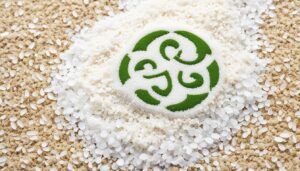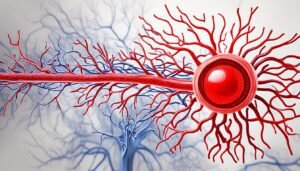High blood pressure, also known as hypertension, is a serious health issue. It increases the risk of stroke, heart attack, and other heart problems.1 Some STIs, like HIV and syphilis, can raise this risk.1 The link between STDs and high blood pressure isn’t entirely clear. Chronic infection and the side effects of some medications could be factors.1 Knowing about this connection is important. It helps in managing both the STD and high blood pressure, which can lower the risk of critical heart issues.
Key Takeaways
- Certain sexually transmitted infections, such as HIV and syphilis, can increase the risk of developing high blood pressure.
- The link between STDs and hypertension is complex, involving factors like chronic inflammation and medication side effects.
- Individuals with HIV are about 35% more likely to develop hypertension compared to those without the virus.
- Syphilis has also been associated with an increased risk of high blood pressure, likely due to its impact on blood vessel function.
- Effectively managing both the STD and hypertension is crucial to reducing the risk of serious cardiovascular complications.
Introduction
High blood pressure is a big risk for heart disease and stroke. It’s often hard to see because it shows no symptoms at first. This makes it tricky to find without regular checks.2 People with HIV have a higher risk of high blood pressure.3 The reasons are not fully understood but it could be due to things like chronic inflammation and certain HIV medications that can raise blood pressure.
High Blood Pressure: A Silent Killer
It can take years for high blood pressure to show any signs, harming the brain, heart, eyes, and kidneys.2 Healthy blood pressure is lower than 120/80 mm Hg. Stage 1 high blood pressure starts at 130/80 to 140/90 mm Hg.2 Stage 2 is 140/90 mm Hg or higher. A crisis is when it reaches over 180/120 mm Hg. This needs immediate medical care.2
HIV and Hypertension Connection
People with HIV have roughly a 35% higher chance of getting high blood pressure.3 We’re not completely sure why, but it might involve ongoing inflammation, side effects of HIV medications, and other factors linked to heart health from HIV.
What is High Blood Pressure?
Blood pressure is the force from blood against artery walls. The heart pushes it around your body. Two numbers measure it: systolic and diastolic.4
Understanding Systolic and Diastolic Pressure
The systolic pressure is higher, when the heart squeezes out blood. The diastolic pressure is lower, when the heart relaxes and fills with blood again.4
Healthy Blood Pressure Range
An ideal blood pressure is under 120/80 mmHg. If it goes over 130/80 mmHg, it’s high. High blood pressure can cause major health problems if not managed.4
What STD Causes High Blood Pressure?
HIV and syphilis are key in the link between STDs and high blood pressure. People with HIV have a 35% higher risk of hypertension.1 The reasons aren’t clear, but issues with inflammation, HIV meds, and heart health could play a part.5
HIV and Increased Hypertension Risk
The link between HIV and high blood pressure might come from gut changes that lead to more inflammation in blood vessels.1 On top of that, those with HIV might be twice as likely to develop heart disease, no matter their blood pressure levels.1 Yet, there’s little known about how HIV might raise the risk for heart problems for those living in cities or with lower incomes, groups that are more likely to get HIV.5
Syphilis: Another STI Linked to Hypertension
Syphilis, a bacterial STI, might increase the risk for high blood pressure. It could be because it affects blood vessels and heart health.5 Knowing the risks can help make better plans for heart health in those groups.5
HIV and Cardiovascular Complications
HIV links with a bigger chance of high blood pressure in various ways5. The virus’s lasting swelling can harm the blood vessels and make them less flexible. This process can add up to higher blood pressure. Some HIV medicines, like protease and integrase inhibitors, might change metabolism. This could also raise blood pressure6.
These medicines might cause weight gain, shift blood fats, and make the body less sensitive to insulin. These can all boost the risk of high blood pressure5. Taking great care of your heart and managing your HIV are key if you’re living with the virus.
Chronic Inflammation and Blood Vessel Damage
Chronic inflammation from HIV can make blood vessels more rigid and prone to damage. This can eventually up your chances of high blood pressure5. If the swelling isn’t controlled, it might severely harm your heart and blood vessels.
HIV Medications and Metabolic Changes
Some HIV drugs, like protease and integrase inhibitors, might mess with your body’s metabolism. This can make it harder for your body to regulate blood pressure6. Such changes could lead to high blood pressure, especially when teamed with weight gain or insulin issues. Managing your HIV and heart health is a big deal because of this.
Symptoms of High Blood Pressure
High blood pressure, or hypertension, often shows no symptoms. It’s known as a “silent killer” for this reason.5 This condition can silently cause harm for years. It leads to severe problems like heart attacks, strokes, or kidney issues. While a few may get headaches, feel short of breath, or have nosebleeds, most won’t.5 To discover high blood pressure, regular check-ups with a doctor are vital.
Diagnosis and Monitoring
Diagnosing high blood pressure, or1 hypertension, is key. It involves using a blood pressure cuff to take measurements. Doctors often recommend checking blood pressure at least yearly. This is part of standard care for everyone.6 But, people who might have a higher risk, like those living with HIV, should get checked more often.
Regular Blood Pressure Checks
Finding high blood pressure early is very important. It lets doctors start treatments to prevent harm to the heart and blood vessels.6 Over time, untreated high blood pressure can be bad for the heart and other organs.
Importance of Early Detection
It’s crucial to monitor blood pressure regularly. This helps spot high blood pressure early, before it causes big problems. If detected early, doctors can help set up plans to manage high blood pressure. This reduces the chances of having a stroke or heart attack.
Lifestyle Changes for Managing Hypertension
Improving your lifestyle can help a lot with high blood pressure. This approach works well with or without medications.7 One key change is to eat healthier. This means cutting back on salt and eating more fruits, veggies, and whole grains. It also means eating less of the bad fats. These steps can lower your blood pressure.2 Exercising regularly is also important. Activities like brisk walking, cycling, or swimming for at least 150 minutes weekly have been proven to lower blood pressure. Plus, finding ways to deal with stress, such as meditation or deep breathing, can make a big difference.
Dietary Modifications
Changing what you eat is vital for controlling high blood pressure. Cutting down on salt and choosing whole, healthy foods cuts your risk. It also helps to eat more fruits, veggies, and grains. These foods are full of nutrients that keep your heart healthy.2 A healthy diet means better control over your blood pressure.
Exercise and Physical Activity
Moving more can directly lower your blood pressure.2 Strive for at least 150 minutes of activity weekly. This could be walking quickly, biking, or swimming. These activities improve your heart and blood flow. They also help with your overall health. So, they’re great for keeping your blood pressure in check.
Stress Management Techniques
Stress is bad for your blood pressure. It can make your heart work harder and your blood vessels tighter.2 To fight stress, try things like meditation or deep breathing. These techniques help your body relax. As a result, your blood pressure may drop. It’s important to find ways to relax. This is a key part of managing high blood pressure.
Medication for Treating High Blood Pressure
If you have high blood pressure, you may need medication alongside lifestyle adjustments. Two common types of drugs are ACE inhibitors and ARBs. They make blood vessels relax and widen. This helps blood flow better.4
ACE Inhibitors and ARBs
ACE inhibitors and ARBs work against the angiotensin system to lower blood pressure. They can reduce both the top and bottom numbers of your blood pressure. This makes them popular not only for regular hypertension but also in HIV patients.4
Diuretics and Beta-Blockers
Diuretics are labeled as “water pills.” They flush out extra fluids from the body. Beta-blockers, on the other hand, slow down the heart and reduce its strain. Both are key in blood pressure control and decreasing heart risks.4
What medicines you get will be based on your blood pressure, health, and any other health issues. Working closely with your doctor is vital. Together, you can figure out the best and safest treatment.4
Special Considerations for HIV Patients
Living with HIV and battling high blood pressure needs special care. Some HIV medicines, like protease and integrase inhibitors, may not mix well with common blood pressure drugs.1 This mix might change how well these medicines work or bring side effects.1
Doctors have to watch how these drugs work together and tweak things when needed. This is vital to keep you healthy and lessen complications.6
The danger of heart problems is higher for those with HIV and high blood pressure. These people might face issues like heart attacks, strokes, and kidney problems.6 So, it’s important to manage both conditions well. Doing this helps lower the health risks for these individuals.6
Medication Interactions
Some HIV drugs, like protease and integrase inhibitors, might not go well with many blood pressure drugs.1 Doctors need to check how these meds interact and adjust them as necessary. This step is key to treating both HIV and blood pressure effectively.1
Monitoring for Complications
People dealing with HIV and high blood pressure need constant checking. Heart attacks, strokes, and kidney issues are major worries.6 Keeping an eye on things and acting ahead of time is crucial. This approach reduces the chance of severe health problems.6
Folks with HIV tend to have high blood pressure more often.6 Plus, rates of heart disease and stroke have gone up among HIV patients in the past ten years.6 Staying vigilant and managing these health issues well makes a big difference.6
Risk Factors for Hypertension
Lifestyle choices are key in dealing with hypertension. Things like what we eat, how much we move, and how we handle stress matter a lot. But, we can’t forget about risk factors we can’t change. For one, as people get older, their blood pressure tends to go up naturally.2 Around the age of 65, people face a bigger risk of having high blood pressure.7 In general, men see higher numbers until the mid-60s. After that, more women tend to develop high blood pressure.
Age and Family History
The history of heart health in a family and the genes we inherit can set the stage for high blood pressure.7 In the U.S., a person’s background can play a role. Those who are Black, Hispanic, or Asian, especially men, tend to have high blood pressure more often.2 Among them, Black non-Hispanic folks have the highest chances of dealing with high blood pressure.
Ethnicity and Underlying Conditions
Conditions like diabetes, issues with kidneys, and problems in the thyroid can lead to high blood pressure too.7 It is common for people with diabetes to also have high blood pressure.2 Diseases like kidney problems, sleep apnea, heart defects since birth, and thyroid issues can cause another kind of high blood pressure.
Prevention Strategies
It’s smart to stop high blood pressure before it starts, especially for those who are more at risk.5 Try to move more every day, like taking brisk walks or cycling, for at least 150 minutes weekly. This can keep your blood pressure lower. Eating well is also key. Choose lots of fruits, veggies, whole grains, and lean meats. But, go easy on the salt, bad fats, and extra sugar to help manage your blood pressure.5
Regular Exercise and Healthy Diet
Adding regular exercise and a healthy diet to your life can really make a difference in stopping blood pressure from going up.5 Work out in ways you enjoy, like brisk walking or swimming, for 150 minutes each week. This can lower your blood pressure. Eating a diet full of fruits, veggies, and good grains, and watching your salt, bad fats, and sugars, helps keep your blood pressure in check too.5
Stress Management and Smoking Cessation
Managing stress well and kicking the smoking habit are important in a top-notch plan to keep your blood pressure healthy.5 Learning stress-busting techniques like meditation, deep breathing, or talking to a counselor can lower your risk.5 Besides, stopping smoking is vital. It’s a big reason people get high blood pressure and other heart problems.5
Following these steps can prevent high blood pressure and lower the chances of heart issues.5
Conclusion
The link between some sexually transmitted infections (STIs) like HIV and syphilis, and a higher risk of high blood pressure is a big health issue.5 We’re still studying why these are connected but know that things like ongoing inflammation and certain medications might be part of it.6 Doctors need to watch blood pressure closely, especially in those more at risk, and help patients with a full health plan, including changes in lifestyle and maybe medicine.5 With the right care for both the STI and hypertension, people can lower their chances of serious heart problems.56
Heart disease is the top killer in the US and the world, and high blood pressure is a big reason why.5 Problems like heart disease and kidney failure because of hypertension are on the rise. We’re seeing more of this in cities where people are poor, have a higher chance of getting STIs, and might use drugs or have dangerous sex.5 This sometimes leads to more deaths from heart disease in those using illegal drugs than from other common causes of death.5
Learning about how STIs and high blood pressure are linked is key for healthcare workers. They can be more active in dealing with this big health problem. Finding it early, treating it strongly, and working on a plan that covers both the STI and the high blood pressure are very important. This helps lower the bad effects on the heart for people with these health issues.6
FAQ
What is the connection between STDs and high blood pressure?
How does HIV increase the risk of high blood pressure?
Can syphilis also increase the risk of high blood pressure?
What are the symptoms of high blood pressure?
How is high blood pressure diagnosed and monitored?
What lifestyle changes can help manage high blood pressure?
What medications are used to treat high blood pressure?
What special considerations are there for individuals living with HIV and high blood pressure?
What are the risk factors for high blood pressure?
How can high blood pressure be prevented?
Source Links
- https://www.webmd.com/hiv-aids/hiv-high-blood-pressure-link
- https://www.healthline.com/health/high-blood-pressure-hypertension
- https://www.ncbi.nlm.nih.gov/pmc/articles/PMC9381495/
- https://www.aidsmap.com/about-hiv/high-blood-pressure-and-hiv
- https://www.ncbi.nlm.nih.gov/pmc/articles/PMC4851924/
- https://www.heart.org/en/news/2018/05/25/whats-the-connection-between-high-blood-pressure-and-hiv
- https://www.heart.org/en/health-topics/high-blood-pressure/know-your-risk-factors-for-high-blood-pressure




